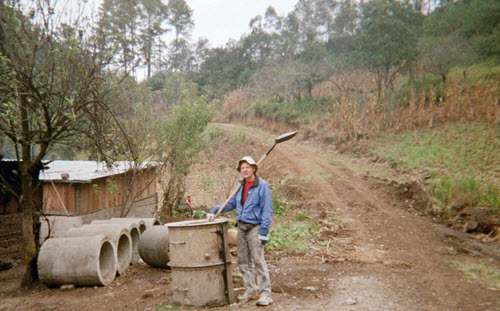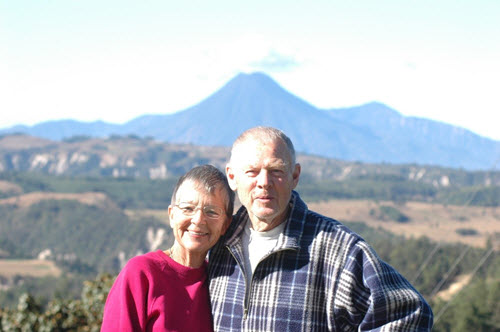Michael Paddock, P.E., M.ASCE, a 30-year member of ASCE, is a licensed civil engineer and surveyor. His professional career was spent managing teams of over 100 engineers designing infrastructure projects over $1 billion, and he was the youngest-ever recipient of Wisconsin’s “Engineer of the Year” award. After a near-death cancer experience, he was motivated to begin a pro bono engineering career that has delivered projects with Engineers Without Borders USA, Rotary, Bridges to Prosperity, and other nonprofits on five continents over the last 20 years.
In today’s Engineering With Heart article, Paddock honors his longtime mentor, Paul Johnson, now battling Alzheimer’s.
***
World Alzheimer’s Day is September 21st, and it is estimated that the disease and related forms of dementia affect millions of people around the world. This dread disease touches nearly all of us.
My longtime mentor, Paul Johnson, P.E., has acute Alzheimer’s disease. It has progressed over the years and slowly tightened its grip on him.
Of course, mentors hold a special place in the engineering profession and our professional development. As a career-long member of ASCE, Paul mentored me on the ASCE Code of Ethics, especially on Canon One and my responsibility for “holding paramount the safety, health and welfare of the public.” Like many mentor-mentee relationships, ours has lasted a lifetime.

Paul is a tall, athletic man who has an amazing sense of humor that always finds a way to make you laugh. His blue eyes dance and his smile draws you in. He is the nicest man I have ever met, and I can’t remember a time he has said anything bad about anyone. Once, he was robbed and lamented, “That’s OK. I’m sure the thief needed my things more than I did.”
We met over 20 years ago at an ice cream shop in Bolivia. I was delivering survey equipment to him that I had kept an extra week for one of my projects. I was afraid of the angry response I might receive, knowing he needed the equipment to build his own volunteer project, a school. I knew I’d have been angry if the roles were reversed.
Of course, there was nothing to be afraid of with Paul. He bought me an ice cream cone and invited me to join him and his wife, Shirley, at their table. We quickly engaged each other in engineering details, much to the chagrin of Shirley, who sighed and read her book.
Paul volunteered his expertise during the latter half of his career, solving infrastructure needs in low-income communities around the globe. He helped start the senior engineering class at Marquette University that designed and built vehicle bridges in Guatemala. Beginning with his first visit to Guatemala in 1992, he helped sharpen the engineering skills of hundreds of students.

Paul recruited me as an advisor at Marquette, saying, “You may have gotten the survey equipment for an extra week, but I’ve got you working in Guatemala for the next two decades. I think that’s a pretty good deal.” I agreed.
Paul was diagnosed a few years ago with Alzheimer’s, but we barely noticed. He continued to be witty, and his humor always brightened our day. But then, we began to see signs of the disease as his memory slowly faded. When Shirley, his wife of 63 years and best friend, passed away last winter, the disease showed no mercy and progressed rapidly.
I continued to visit my friend in the Alzheimer’s wing of the assisted living home to reminisce about old times. He always insisted, “Shirley is visiting a friend. When she gets back, let’s have a slice of her award-winning pie together,” not remembering she had passed away.
“Maybe next time,” I replied, trying to force a smile.
I struggled to connect with Paul as Alzheimer’s continued to tighten its hold. Then I had an idea.
I would bring a set of plans from a student-designed Guatemala project on my next visit. After a discussion with the Alzheimer’s Association, I had learned that since Paul used his brain so much for engineering, that part might be with us the longest. We agreed I should give it a try.

When I rolled out the drawings, Paul’s brain sprung to life. The 87-year-old engineer dove into the plans and calculations with all his former zeal. Solving problem after problem, he stayed fully engaged until a final design was found – “an elegant solution” as we engineers would say.
“There, now that’s a great project!” he said, smiling widely and pushing back from the table with a deep sigh. It was the same feeling of accomplishment every engineer has at that moment, and I was happy to see him experience it again.
At each session, we review the same plans as he doesn’t remember my previous visit. That’s OK. I will never tire of seeing his look of satisfaction when he finds that “elegant solution.”
I don’t know what the future holds for Paul and me. It might be “Engineers 1 – Alzheimer’s 0” at halftime, but we all know how this game will end. Still, I like to believe that even as Alzheimer’s continues its cursed progression, the engineer will always remain.
Try as it might, even Alzheimer’s hasn’t taken the engineer out of The Engineer.



A true heart felt story. Engineers may not go in operating rooms to save lives. But they save lives by making good things in life.
Awesome!!
Mike, eloquent story that captured the genius and personality of Paul Johnson. He truly is a magnificent engineer and is masterful in solving engineering drainage problems. He was my mentor for over 15 years and he helped me develop into a much better engineer and person. I learned how to be a much better communicator and had fun working side by side with him. An example of his wit that I experienced once was during a meeting with a client. Paul & I were meeting with a person who wanted to hire us for a project and Paul presented our Agreement. Paul went through the contract explaining the scope of services and fees. The individual was very pleased with the explanation of services and said to Paul this is exactly what I wanted. He then said will you be willing to negotiate your fees. Paul didn’t hesitate and said “yes, I’m always willing to negotiate a higher fee.” The individual smiled and signed the Agreement as presented.
He also told me he once was stopped for speeding slightly over the speed limit with an older car he owned and the police officer stepped up to his window and asked: “Do you know how fast you were going and Paul said: well not really but my speedometer said 90.” The officer smirked and told him to get his speedometer fixed and gave him a verbal warning.
Paul is truly a giant man, very smart, self effacing and a friend to everyone. He represented the engineering profession in an exemplary fashion throughout his career.
Rick Smith, P.E.
Paul also introduced me (and many others) to the pleasure of working with the wonderful people of Guatemala. His good work continues. An engineering career well spent.
Thank you, Mike, for the wonderful comments re Paul Johnson. He and Shirley were an incredible couple applying Paul’s incredible engineering knowledge to impact multiple societies in a variety of countries with Guatemala being a MAJOR one. Thank you, also, for you wonderful friendship and comrade times with him. Peace, Sara and Bud Hudson
I do not know this person, but that is a real heart warming story of a Professional Engineer.
Paul hired me at R.A. Smith in 1992 and he truly was a wonderful person to work for and learn from. I also enjoyed many of the slideshows of his mission trips at WSPE meetings and would run into Paul and Shirley at Friday Night Live outings in Waukesha in the summer. They were both such wonderful and giving people.
I loved the picture of Paul in your article, finding that elegant solution. He has such a wonderful, genuine smile, especially when he is figuring out engineering problems. I am so glad that you are bringing that joy back to him.
Oh this is a beautiful story! We should always keep in mind that even though a person with Alzheimer may forget who you are, you should never forget who that special person is in your life!
Well written, Mike. Thank you for sharing. Alzheimer’s is a dirty rotten thief. I’m glad you’re still able to (outwit that thief for a minute to) spend some quality time with the Paul we all know and love.
Well done Michael!